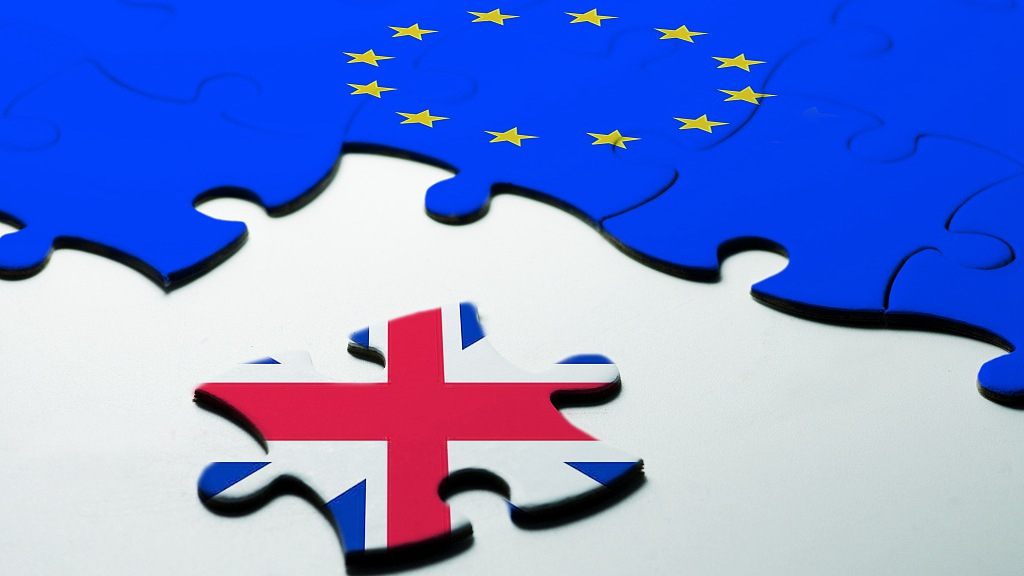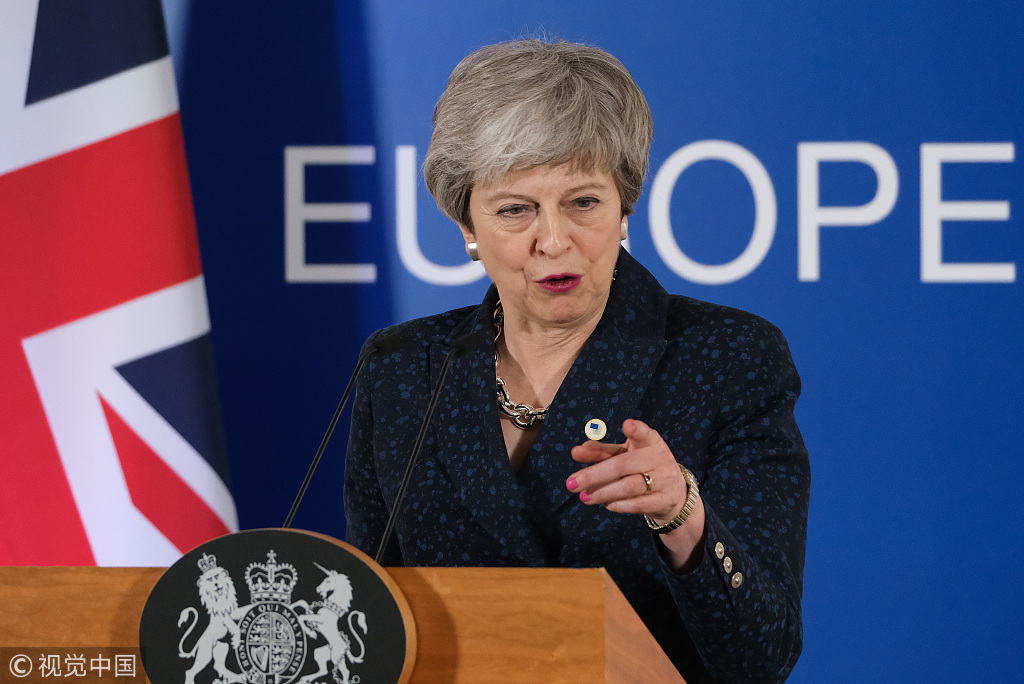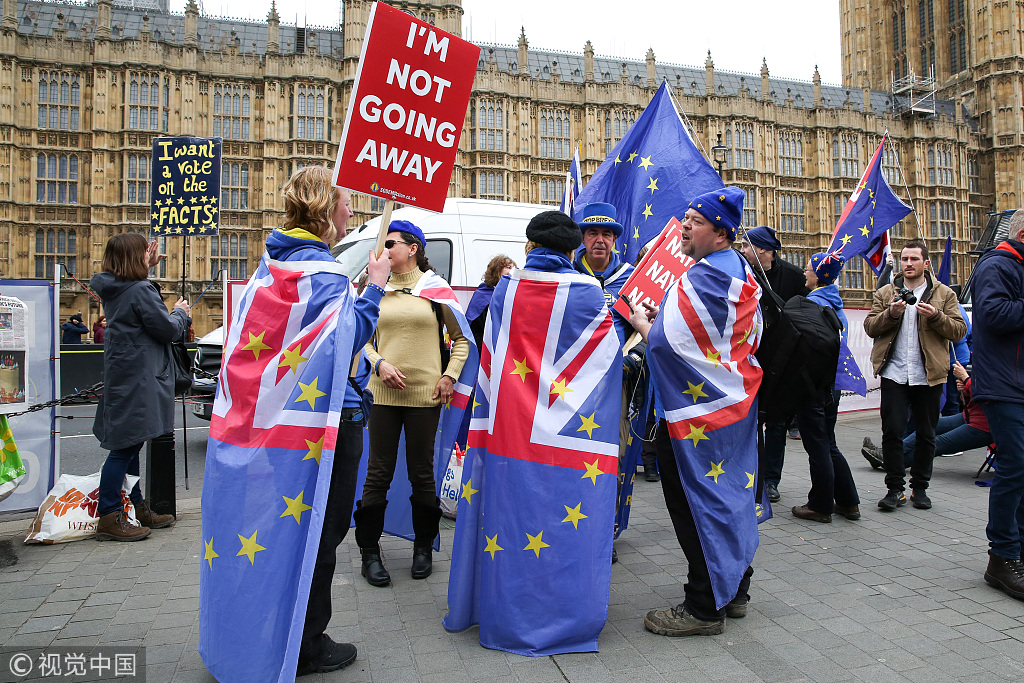
Opinion
12:42, 22-Mar-2019
The Brexit ultimatum – Britain in turmoil
Tom Fowdy

Editor's note: Tom Fowdy, who graduated from Oxford University's China Studies Program and majored in politics at Durham University, writes about international relations focusing on China and the Democratic People's Republic of Korea. The article reflects the author's views, and not necessarily those of CGTN.
Thursday saw an EU summit with British Prime Minister Theresa May and leaders on the continent agree to a short term extension of Brexit, but on very strict conditions. The process of Brexit will be delayed until May 22, if MPs are willing to finally pass the deal agreed by May and Brussels last year. If not, then Brexit can only be delayed until April 12 with the ball placed in Britain's court on "finding a way forwards."
This news is a dramatic development: It effectively means that EU leaders are doubling down on the deal which they have offered to Britain, the same as to which has failed twice in the House of Commons. In doing so, the outcomes are being narrowed to a very simple choice: Accept what has been offered, or be thrown off the cliff with a no-deal by default, save of course something radical happens which changes the status quo.

British Prime Minister Theresa May speaks to the media at the end of the first day of a two-day summit of European Union leaders in Brussels, Belgium, March 21, 2019. /VCG Photo
British Prime Minister Theresa May speaks to the media at the end of the first day of a two-day summit of European Union leaders in Brussels, Belgium, March 21, 2019. /VCG Photo
This is not good news. As is known, Europe has made an offer and is sticking to it, they appear to underestimate the political divides which are accumulating in the persistent rejection of May's deal with them. With there being strong evidence that MPs will ultimately reject it for a third time, especially Conservative rebels and the Labour Party, this now means a potential crisis is approaching; one which may be catastrophic for Britain's economy. In order to prevent a no-deal or an annulment of Brexit altogether, the prime minister would be forced to either resign, call a general election or implement another referendum.
The European Union have long made it clear that their offer to Theresa May's government concerning Brexit is the only one they are willing to make concerning Brexit which does not involve a reversal of the process itself. There can be no more concessions. As Jean-Claude Juncker, president of the European Commission, stated after the meeting: "This closes and completes the full package. There is no more that we can have."
Feeling certain on what they have offered, they have responded to Theresa May's request by making it a condition of the given Brexit deadlines: If Parliament passes the deal, then Brexit can be finalized at the end of May. If it does not, then Britain must offer the EU a new way forwards before April 12 as to what it wants. Thus, forcing a crunch decision before that timeframe save a no deal happens by default.
However, EU leaders seem to be again misinterpreting the flow of British politics, seemingly being unable to grasp the extent of the opposition against it not just within other parties, but also within Theresa May's own party. Making this deal conditional upon a very slim deadline for a default exit is not likely to give it any more chances of success than the last two times. In fact, it entails the opposite. When it comes to a third vote in the Commons: Rebel Eurosceptic MPs will almost certainly oppose it again, eyeing the ability to force a no-deal outcome that they crave and destroy the agreement which they see as an infringement on UK sovereignty owing to the "Northern Ireland backstop" dilemma.

Anti-Brexit demonstrators stand outside the Houses of Parliament in London, UK, March 19, 2019. /VCG Photo
Anti-Brexit demonstrators stand outside the Houses of Parliament in London, UK, March 19, 2019. /VCG Photo
In addition, the Labour Party will also likely oppose it again. They will see an opportunity in blocking the deal and bringing down Theresa May's government, in the bid to force a general election or a resignation of the prime minister. There will not be a "national consensus" supporting the deal as a necessary evil, there is much to gain politically by voting it down.
In this case, we can almost certainly expect a crisis. That is, a crisis of national leadership. When the deal gets voted down again, Britain has a matter of weeks to conjure up something new to prevent a no-deal by default. April 12 constitutes the deadline because that is when the country must state as to whether it will participate in European elections or not. So in this case, by this point it must agree to either participating them and thus requesting another extension, thus jeopardizing Brexit for good, or otherwise leaving without a deal.
But in any case, domestic politics will in tandem ensure that should the country be faced with this scenario, something big will have to change. Theresa May's premiership will be completely untenable, she will have to concede to either A) resigning B) calling a general election or C) advocating a second referendum. In either way, this ensures more uncertainty, turmoil and political chaos which will have a profoundly destabilizing effect on Britain for a long time. Big decisions or on the horizon and few can accurately predict what will happen.
(If you want to contribute and have specific expertise, please contact us at opinions@cgtn.com.)

SITEMAP
Copyright © 2018 CGTN. Beijing ICP prepared NO.16065310-3
Copyright © 2018 CGTN. Beijing ICP prepared NO.16065310-3